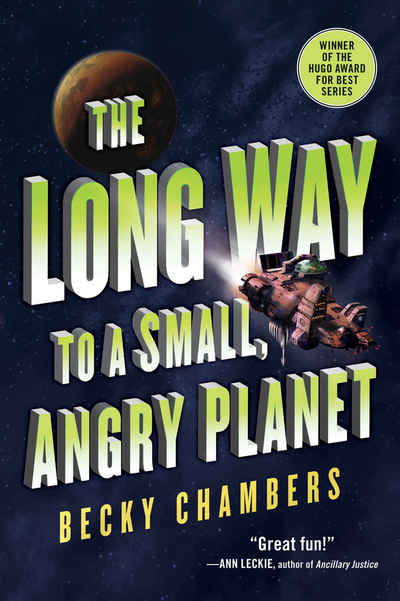This is one of those books that, despite having won a bunch of awards and being widely acclaimed, also has a slew of recent one-star reviews. And while I’m a firm believer that there’s no accounting for taste, I have also learned to be wary of one-star reviews. It’s hard for me to imagine how I would end up reading a book so devoid of value as to warrant that lowest rating. Was the story so different from the blurb on the back cover that it felt like a bait-and-switch?
No, in my experience these negative reviewers usually have a clear agenda, and their mind was made up before reading the first page.
So it is with Small, Angry Planet — The negative reviews all seem to come from small, angry men who want to punish the author for writing a story with characters who are different from you and me, and different from one another. Despite the fact that the book in question is a science fiction novel set in a multi-species galactic federation (the Galactic Commons, or GC), the notion of diversity — accommodating, expecting, and embracing difference — seems to set these reviewers off like a slap in the face.
But enough about those delicate snowflakes. It’s their loss. This book is a wonder from start to finish. I loved it.
As the title implies, the story is about a long-haul journey to a planet that ends up being less than hospitable for the crew of the intrepid Wayfarer, whose job it is to tunnel a wormhole from this planet back to civilization. And while I don’t know yet what the rest of the series holds, I wouldn’t classify this book as space opera: The unfolding galactic drama just seems like a convenient device to place these characters on a long trip together. Along the way we learn about their various species (about half human, half non-human), the ways they all get along (or don’t), and the history of the Galactic Commons.
But most importantly we get to know their personalities. There’s Ashby, the Wayfarer‘s even-handed human captain; Sissix, the snarky Aandrisk pilot; Corbin, the misanthrope human scientist; Kizzy and Jenks, the quirky human techs; Dr. Chef, the caring Grum doctor-slash-chef; Ohan, the reclusive Sianat Pair navigator; and Lovey, the sentient AI that has become part of the crew. And finally there’s Rosemary, the first character we meet when she joins the Wayfarer‘s crew as clerk — with a few skeletons in her closet.
These characters all seemed familiar, but not in a way that felt derivative. Like the beloved crew of the Firefly-class ship Serenity, they were all flawed and perfect, and watching their relationships develop is what kept me turning the pages. If you’re expecting a ton of action, you’ll be disappointed; If, on the other hand, you want characters you’ll learn to love, this book is for you.
